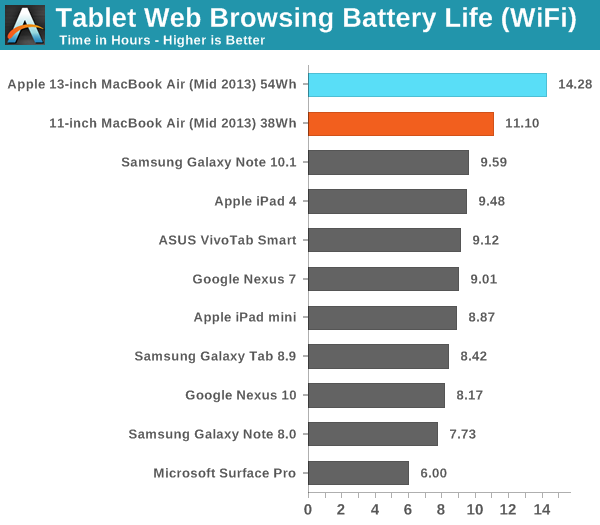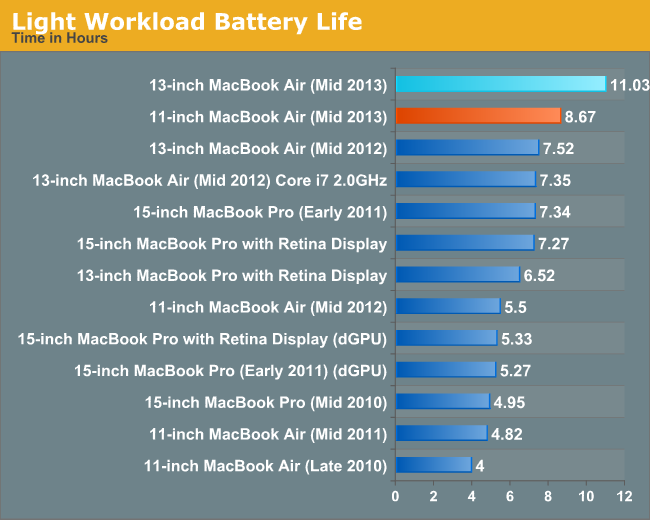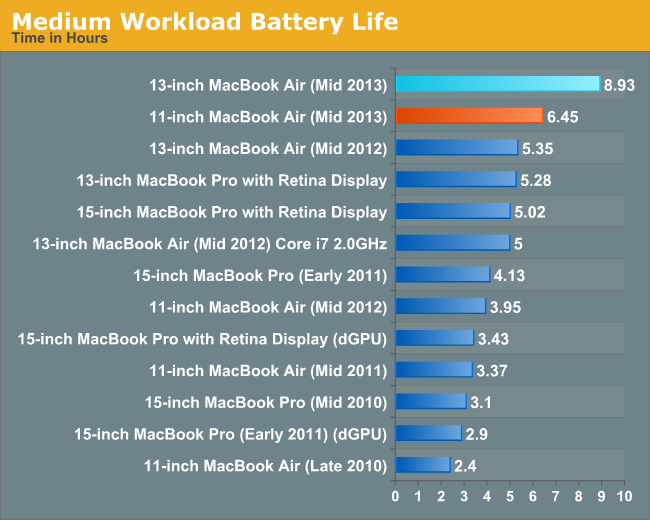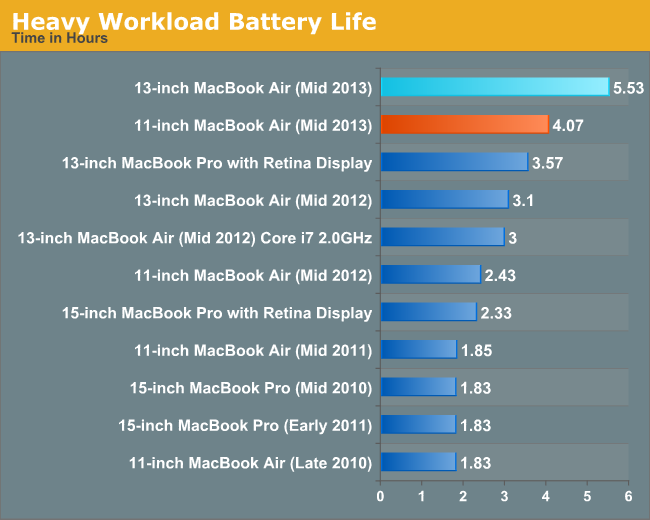The 2013 MacBook Air Review (11-inch)
by Vivek Gowri on August 9, 2013 1:45 AM ESTHonestly, for me, this is by far the most important part of the review. With there being not much in the way of performance upgrades or new features compared to previous generation Airs, the battery life improvement is basically at the heart of what makes the new Air attractive. Obviously, this isn’t exclusive to just Apple—any Haswell ULT Ultrabook with 40-50Wh of battery capacity should get you 8-10 hours of battery life.

But it’s honestly amazing to use a fully fledged notebook that can battle Atom and ARM for battery life. The image from Anand’s 13” Air review showing an estimated 16 hours of battery life was awesome, even if the OS X battery runtime estimate tends to be wildly optimistic in the early part of a battery cycle. The 11” isn’t quite that far, but it still has better battery life than my iPad. Granted, my 3rd-generation iPad now has a year of wear on the battery, but still—it’s longer lasting than my iPad was when new, and it’s also longer lasting than the 4th gen iPad. And not just by a little, it’s a pretty significant step up. That’s a really important corner to turn for the notebook market, double digit battery life without having to resort to an extended or secondary battery like some business notebooks have offered in the past.
As Anand covered in his recent Haswell ULT battery life article, Intel still needs to work on the power efficiency of the Haswell video decode engine, since ARM-based SoCs still hold a sizable advantage there. But other than that caveat, the overall power consumption of Haswell is an absolute game changer. I’ve never even thought to take the power cord with me anywhere in the month that I’ve had it. Want to take the Air for a weekend away and not plug it in once, iPad style? Depending on how much of your usage can get pushed to a smartphone, that’s a legitimate and realistic possibility.
The 11” Air, by virtue of its smaller display, is slightly more efficient than its larger sibling, but the 42% advantage in battery capacity pushes the 13” Air’s battery life into the insane range. Being able to rely on nearly 10 hours of battery life or more in most normal use cases is just ridiculous. The 11” is a bit less phenomenal, but anything that can claim better battery life than the iPad, even with a smaller battery, is doing just fine.



At 8.5 hours dead on in our usual Mac light browsing test, the 2013 11” is three hours ahead of the 2012. That’s 54.5%. It’s nuts, the end. That advantage holds basically through the rest of our more strenuous battery life tests. The previous 11” really had an issue with battery life—the real-world 5 hours of runtime just didn’t cut it given the sacrifices made for mobility; it made much more sense to get a 13”. Now, with 8+ hours of runtime, it’s easier to ignore. The jump from 5.5 to 7.5 hours of battery life makes a pretty significant difference in how the system gets used, but I’m less sure about the difference between 8.5 and 11. Once you’re already in that 8-10 hour battery life range, adding two or three hours on top of that is a lot less valuable than it would be in a situation where you’re adding that amount to get to that range. This isn’t to say that more battery life isn’t always better, just that at some point it becomes something that is nice to have rather than something that changes the essence of the system, almost like the difference between an i5 and an i7 CPU.










139 Comments
View All Comments
jutre - Thursday, August 15, 2013 - link
Sorry name99, but I do not really mind your opinion, given your clear lack of judgment in posting comments. If you re-read carefully my post and the one from purerice, you will not find any complaint.jutre - Thursday, August 15, 2013 - link
I have not worked with a SSD-based computer so far. I am used to keeping multiple applications opened at the same time, because launching them takes to much time, so I really need 8Gb or RAM on my 2009 Imac. With an SSD-based laptop, maybe usage patterns change and you no longer need as many apps opened at the same time, so need less RAM ?HodakaRacer - Saturday, August 10, 2013 - link
Battery life and Performance with windows bootcamped? I know Anand tweeted about running windows on it..cindaydavilla - Saturday, August 10, 2013 - link
my buddy's step-aunt makes $61 every hour on the computer. She has been without work for 6 months but last month her pay was $14651 just working on the computer for a few hours. Here's the site to read more... www.max38.comccd2 - Saturday, August 10, 2013 - link
I disagree with you comment on the iPad versus MBA 11". After using the iPad for 6 months, I understand why you believe tablets are going to settle in at 7-8". That size tablet is easy to hold in one hand and, even more importantly, light enough to hold with one hand for extended periods of time. So why would I want the MBA which is even more awkward to handle??? It's even heavier, the keyboard does not fold fully around like the Yoga or detach. The MBA isn't better than an iPad because it can't be used the way most of us use a tablet.And as a PC? Why get the MBA when a larger PC like the 13" MBA is simply a better device?
Convergence devices like the 11" MBA have to make a decent compromise between tablet and PC to justify their often premium prices. I just don't see any device which has made a compelling argument for these devices. Some are getting close, like the Surface Pro or XPS12, but there is still more development to be done
FwFred - Saturday, August 10, 2013 - link
You hold a laptop (it's in the name "lap") far differently than a tablet. A 13" laptop is not awkward in the least. A 13" tablet is laborious to use. The point of the 11" is you bring your computer with you. When you get home, you can even dock it to a keyboard/mouse/monitor and use full fledged desktop software.I agree a 13" laptop is a better experience... unless you are very mobile and you always have your laptop stuffed in your bag.
ccd2 - Saturday, August 10, 2013 - link
You kind of support my point. Used as a laptop, in your lap, an 11" PC doesn't offer any real advantage over a 13" laptop. Stuffed in my bag, the weight difference doesn't matter much either. A 11" laptop needs to be some sort of convergence device for most of us, otherwise there are better options like a bigger laptop.Impulses - Saturday, August 10, 2013 - link
I've kind of given up on convergence devices for now... I enjoyed my Transformer, but I've moved on to a smaller Nexus 7. I was excited about Surface Pro, but it's just too much of a compromise for the price... Same for the 11" MBA. Even $500 Silvermount convertibles that finally break past the Atom performance envelope are unlikely to tempt me.I guess there's a reason the traditional laptop form factor has endured... I think some of the more interesting convergence devices are actually those that stick to one role without sacrifices and only offer extra versatility as a second choice... The Yoga 13 hinge design is rather appealing, I doubt I'd prop it up like an easel or whatever often but it takes nothing away from it's role as a laptop.
ccd2 - Saturday, August 10, 2013 - link
I agree. I'm looking at the new Nexus 7 as well. The problem with convergence devices is that they charge a premium for being a convergence, but just don't work that well. For the price of most of them, I can have a good 7" tablet and a larger PC with no compromises.name99 - Saturday, August 10, 2013 - link
The value of a large iPad is as a document reader. Not an eBook reader, but a technical document reader --- generally, but not limited to PDFs. This market appears to be large enough (individuals who most read tech documents, like myself, business use cases, and older people with bad eyes for whom the extra screen space is worth the other hassles) to sustain the 10" iPad indefinitely. Heck, if we assume the rumors to be true, there is enough of a demand for document readers that it makes sense for Apple to try a 13" iPad form factor.The basic point is that people use these devices in different ways. There is no way I would ever consider a 7" iPad -- it is useless for my specific needs. But obviously other people love it.
It is a waste of time from the point of view of market analysis to rely on anecdote ("I use this device in this way, and likewise all my [demographically identical] friends".)
Unless one has specific numbers regarding how people use devices, we have to rely on the common sense observation that if a company keeps making and selling a product, there is a substantial group of people who want it. Apple has been selling the 11" MBA for a while now. This seems to suggest that, in spite of your theoretical analysis, there IS a large enough group of people for whom this size is best that it remains a viable product.
I am sympathetic to your analysis. I have made a very similar analysis claiming that one of the reasons Surface Pro is not a viable product is because it fits uncomfortably between the cell phone (which everyone has and which serves mobile tasks well) and the laptop (which everyone has if they hope to do any sort of real work with Windows).
But at the end of the day, we have to calibrate these arguments to reality, especially if they're arguments from the gut without numbers to support them. I'd say reality supports my argument (Surface Pro is not and will not be viable) whereas it does not support your argument.
(It would be an interesting twist on your argument to consider why Apple can sell this form factor successfully whereas Windows cannot. Perhaps it is the very fit and finish of Apple --- a quality keyboard and trackpad --- along with OSX and its support for full-screen apps with maximum use of the display and easily controlled multiple virtual displays --- which makes the difference. A lousy keyboard and trackpad may be more painful in smaller form factor, and Windows full screen mode may still include enough chrome that each window is just that much less useful? In theory Windows8 Metro solves the chrome problem, but Metro has its own issues in that it does a terrible job of information density. Space isn't wasted in chrome, instead it's wasted everywhere.)